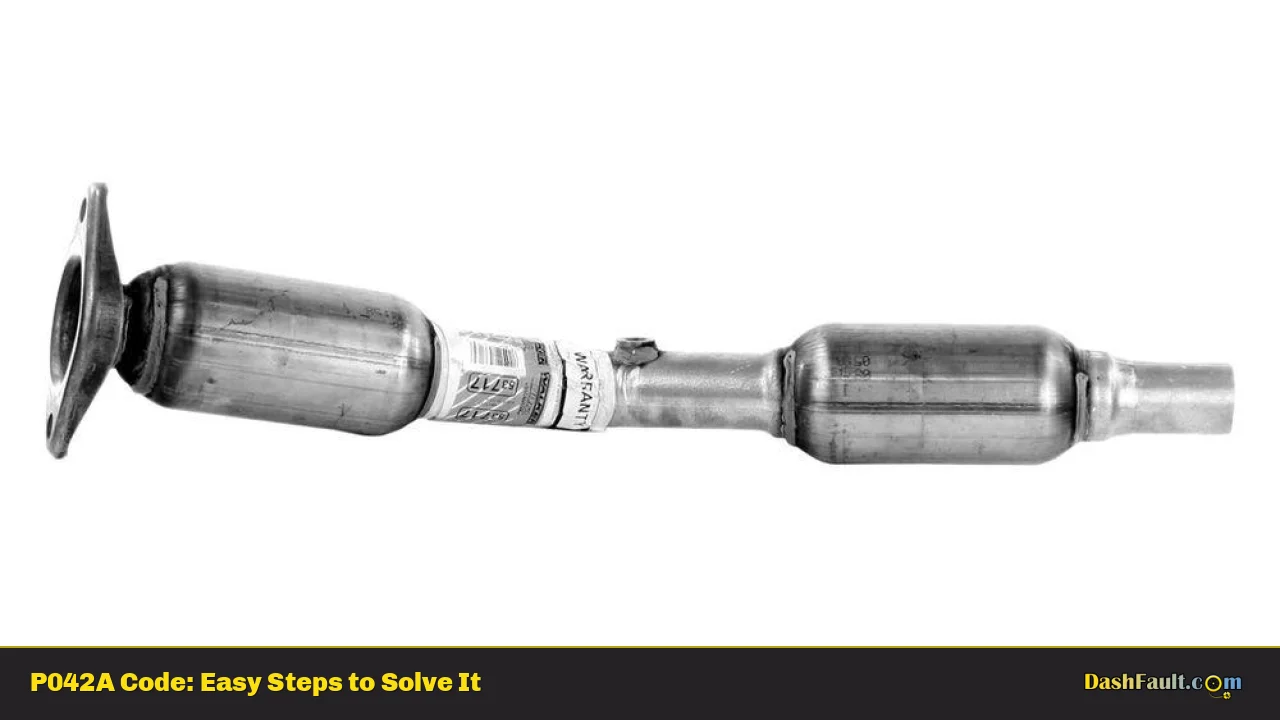The P042A trouble code is a diagnostic code that indicates a malfunction in the catalyst temperature sensor circuit for Bank 1, Sensor 2. This code is part of the On-Board Diagnostics II (OBD-II) system, which monitors various components of a vehicle’s engine and exhaust systems to ensure optimal performance and emissions control. When the Engine Control Module (ECM) detects an issue with the temperature sensor circuit, it triggers the P042A code, which can lead to increased emissions and reduced engine efficiency.
| P042A Code Meaning | P042A Code Common Causes |
|---|---|
| Catalyst Temperature Sensor Circuit Malfunction (Bank 1 Sensor 2) | Defective catalyst temperature sensor |
| Sensor signal out of range | Wiring issues or poor electrical connections |
| Faulty oxygen sensor readings | Exhaust leaks affecting sensor performance |
| PCM programming errors | Faulty catalytic converter |
| Engine mechanical issues (e.g., misfires) | Unbalanced air-fuel mixture |
Symptoms of P042A Code
When the P042A code is triggered, several symptoms may manifest, including:
- Check Engine Light: The most common indication is the illumination of the check engine light on the dashboard.
- Poor Engine Performance: Drivers may notice decreased power or responsiveness from the engine.
- Reduced Fuel Economy: A malfunctioning sensor can lead to inefficient fuel usage, resulting in lower miles per gallon.
- Increased Emissions: The vehicle may produce higher levels of harmful emissions due to improper exhaust management.
Technical Explanation of P042A Code
The P042A code specifically refers to problems with the catalyst temperature sensor circuit located downstream of the catalytic converter. This sensor plays a crucial role in monitoring the temperature of exhaust gases after they pass through the catalytic converter. The ECM uses this data to adjust fuel injection and ignition timing, ensuring that the engine runs efficiently and within emission standards.
How the Catalyst Temperature Sensor Works
The catalyst temperature sensor typically operates as a thermocouple or thermistor. As exhaust gases pass through it, the sensor generates a voltage signal proportional to their temperature. If this signal deviates from expected values, indicating overheating or insufficient heating, the ECM will trigger a fault code like P042A.
Step-by-Step Diagnosis of P042A Code
Diagnosing a P042A code involves several steps to identify and rectify the underlying issue:
- Visual Inspection:
- Inspect wiring and connectors associated with Bank 1, Sensor 2 for signs of damage or corrosion.
- Check for exhaust leaks that could affect sensor readings.
- Scan for Codes:
- Use an OBD-II scanner to confirm that P042A is present and check for any accompanying codes that might indicate related issues.
- Test Sensor Functionality:
- With the engine running, measure the voltage output from the catalyst temperature sensor using a multimeter.
- Compare this reading with specifications found in vehicle service manuals.
- Check Electrical Connections:
- Verify that all connections are secure and free from corrosion.
- Test for continuity in wiring between the sensor and ECM.
- Inspect PCM Programming:
- If all hardware checks out but issues persist, consider whether the PCM needs reprogramming or replacement.
Solution Methods for P042A Code
To resolve a P042A code effectively, follow these methods based on diagnosis:
- Replace Faulty Sensors: If testing indicates that the catalyst temperature sensor is defective, replace it with an OEM equivalent.
- Repair Wiring Issues: Fix any damaged wiring or connectors found during inspection to restore proper electrical flow.
- Address Exhaust Leaks: Repair any leaks in the exhaust system that could be causing erroneous readings from sensors.
- Reprogram or Replace PCM: If all else fails, consult a professional about reprogramming or replacing the PCM if it is determined to be faulty.
Cost Estimates for Repairs
Repair costs can vary widely based on location and specific vehicle models but generally include:
- Catalyst Temperature Sensor Replacement: $100 – $300 (parts and labor)
- Wiring Repairs: $50 – $150 depending on complexity
- PCM Reprogramming/Replacement: $200 – $800 depending on dealership vs. independent shop rates
Warnings and Recommendations
- Always ensure safety by disconnecting battery terminals before working on electrical systems.
- If unsure about any step in diagnosing or repairing your vehicle, consult with a certified mechanic to avoid further damage or safety risks.
- Regular maintenance checks can help prevent issues related to sensors and emissions systems.
Frequently Asked Questions About P042A
- What does P042A mean?
The P042A code indicates a malfunction in the catalyst temperature sensor circuit for Bank 1, Sensor 2. - How serious is a P042A code?
This code can lead to increased emissions and reduced fuel efficiency; thus, it should be addressed promptly. - Can I drive my car with a P042A code?
While it may be possible to drive short distances, it’s advisable to fix this issue as it can lead to more severe problems. - What are common causes of P042A?
Common causes include faulty sensors, wiring issues, PCM errors, and exhaust leaks. - How do I fix a P042A code?
Fixing involves replacing faulty sensors, repairing wiring, addressing exhaust leaks, or reprogramming/replacing the PCM. - Will clearing the code fix my car?
Clearing the code may temporarily turn off the check engine light but won’t resolve underlying issues. - What tools do I need to diagnose P042A?
A basic OBD-II scanner and multimeter are essential tools for diagnosing this trouble code. - Is professional help necessary for P042A?
If you’re not comfortable with DIY diagnostics or repairs, seeking professional assistance is recommended.
In conclusion, understanding and addressing the P042A trouble code is crucial for maintaining your vehicle’s performance and compliance with emission standards. By following systematic diagnostic steps and applying appropriate solutions, vehicle owners and DIY mechanics can effectively resolve this issue while ensuring their vehicles run smoothly. Regular maintenance checks can also prevent future occurrences of similar codes.
